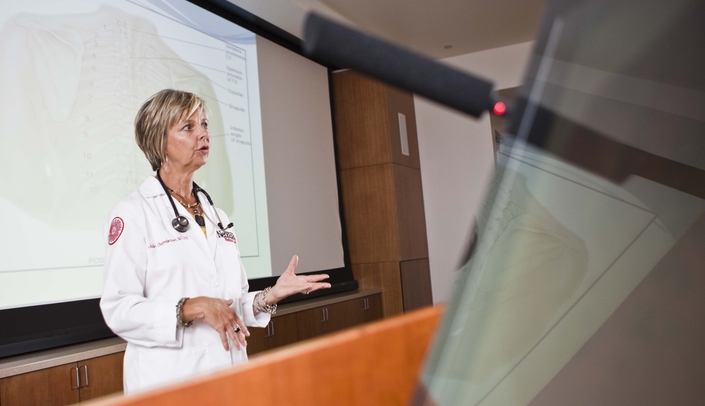To better meet the growing demand from advanced practice nurses with leadership and research skills, the University of Nebraska Medical Center College of Nursing is expanding its Doctor of Nursing Practice (D.N.P.) degree to reach more students.
Beginning Oct. 15, applications will be accepted from nurses with bachelor’s degrees in nursing interested in earning a D.N.P. degree.
The program, which will help prepare more nurses to meet the growing health needs of Nebraskans, is available at the college’s five campuses in Omaha, Lincoln, Kearney, Scottsbluff and Norfolk. Students accepted for the BSN to DNP program would begin in the fall of 2015.
The degree is for those who want to expand their nursing career options as advanced practice registered nurses (APRN). Potential candidates include nurse practitioners, clinical nurse specialists and nurse administrators who wish to further develop their leadership and research skills to improve health care delivery and patient outcomes.
Advanced practice nurses diagnose, treat, prescribe medication and deliver health promotion/disease prevention services. The D.N.P. degree provides the skills needed for individuals seeking leadership positions or clinical administrative roles.
In addition, graduates also could serve as faculty members in nursing education programs and provide leadership for changes in nursing practice and health policy.
The D.N.P. program began in 2011 with admission of advanced practice registered nurses with master’s degrees in nursing. To date, 16 have graduated from the program with 27 currently enrolled.
It is increasingly becoming the norm that those wanting to become APRNs and nurse administrators pursue the D.N.P., whereas before it was the master’s degree only.
The D.N.P. path requires fewer required credit hours than taking the master’s and D.N.P separately, which also means it’s a faster way to earn the degree, said Juliann Sebastian, Ph.D., dean of the UNMC College of Nursing. In addition, she said APRNs with leadership and research skills are in demand nationwide.
“This degree will enable these new nurse leaders with advanced clinical expertise, leadership and research skills, to close some of the gaps in health care and improve outcomes for patients,” Dr. Sebastian said. “We see a need for these skills in the metropolitan areas and especially in small towns, rural areas and underserved metro neighborhoods.”
The program includes a minimum 1,000 clinical hours. Students pursue a specialty APRN track – for the nurse practitioner, clinical nurse specialist or nurse administrator track. Classes will be taught through Internet distance technology and clinical training will occur at hospitals and other clinical sites throughout Nebraska including rural and critical access hospitals.
The degree can be completed in three years if attending full time. Part-time attendance also is an option.
Sue Barnason, Ph.D., professor and director of the DNP program at the UNMC College of Nursing, said the curriculum includes innovative and evidence-based health research, which in the end will result in better patient care.
“The demand for a doctoral education for nurses has increased with the expansion of scientific knowledge and growing concerns about the quality of patient care delivery and outcomes,” Dr. Barnason said. “These leaders will have a much better understanding of health systems and apply their education to improve care, quality and safety for patients.”
The college will be accepting applications soon. For more information, contact Will Roberts at 402 559-4120 or will.roberts@unmc.edu.
Through world-class research and patient care, UNMC generates breakthroughs that make life better for people throughout Nebraska and beyond. Its education programs train more health professionals than any other institution in the state. Learn more at unmc.edu.
